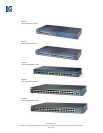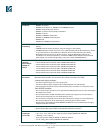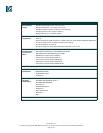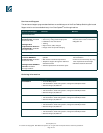
Cisco Systems, Inc.
All contents are Copyright © 1992–2003 Cisco Systems, Inc. All rights reserved. Important Notices and Privacy Statement.
Page 10 of 15
Ease of use and
deployment
• Cisco Express Setup:
– Simplifies initial configuration of a switch via a Web browser, eliminating the need for
more complex terminal emulation programs and CLI knowledge.
– Reduces the cost of deployment by enabling less-skilled personnel to set up switches
quickly and simply.
• Auto-configuration eases deployment of switches in the network by automatically
configuring multiple switches across a network using a bootp server.
• Autosensing on each port detects the speed of the attached device and automatically
configures the port for 10- or 100-Mbps operation, easing the deployment of the switch
in mixed-speed environments.
• Auto-negotiating on all ports automatically selects half- or full-duplex transmission mode
to optimize bandwidth.
• Link Aggregation Control Protocol (LACP) allows the creation of Ethernet channeling with
devices that conform to IEEE 802.3ad. This is similar to Cisco EtherChannel and PagP.
• Cisco Discovery Protocol versions 1 and 2 enable a CiscoWorks network management
station to automatically discover the switch in a network topology.
• Cisco VTP supports dynamic VLANs and dynamic trunk configuration across all switches.
• Support for dynamic VLAN assignment through implementation of VLAN Membership
Policy Server (VMPS) client functions provides flexibility in assigning ports to VLANs.
• Voice VLAN simplifies telephony installations by keeping voice traffic on a separate VLAN
for easier network administration and troubleshooting.
• The default configuration stored in Flash memory ensures that the switch can be quickly
connected to the network and can pass traffic with minimal user intervention.
Feature Benefit

















